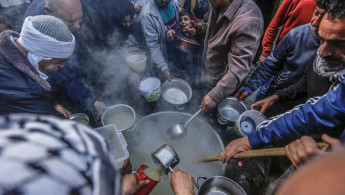For sixth Ramadan in a row, Gazan launches initiative to feed poor families
For the sixth year in a row, Walid al-Hattab, a Gaza-based man cooks "Garisha soup", a traditional Palestinian soup, in a huge bowl in a bid to feed poor families in his neighbourhood.
Crushed wheat, beef or lamb meat, and onions are the main ingredients of al-Hattab's soup, cooked in a big pot which is heated on a firewood stove in front of his house in the al-Shujaiya neighbourhood within the besieged coastal enclave.
The 57-year-old father of eight told The New Arab that he launched the initiative as a means to revive a Palestinian tradition in helping poor families to survive.
"In the past, our parents and grandfathers used to cook in the streets to allow the low-income families to take their food without asking anyone to help them," al-Hattab said. "Our people have been facing difficult living conditions for many years."
This Ramadan, Gaza's families struggle to eat as food prices soar for a second month in a row
— The New Arab (@The_NewArab) April 4, 2022
@The_NewArab https://t.co/ZNZgjAglaq
According to the Euro-Mediterranean Human Rights Monitor, about 1.5 million residents in Gaza have become impoverished due to the Israeli-imposed air, land, and sea blockade on the coastal enclave.
In 2006, Israel imposed a blockade after Hamas, a Palestinian Islamist group, won a general election in the territory. Hamas' electoral success resulted in fighting with rivals from Fatah, the faction that currently dominates the Palestinian Authority (PA).
Israel further tightened its blockade after Hamas forcibly took over the territory from Fatah in 2007.
The United Nations Relief and Works Agency for Palestine Refugees (UNRWA) estimates that 80% of the Gazans, the majority of whom are refugees, are facing major food insecurity and depend on aid and handouts to survive.
"In Ramadan, the situation has become complicated as the families need more money to feed their members," al-Hattab said, adding that "I used to feed about 130 families a day in Gaza."
"I am not here to solve the economic problems that were caused by the politicians, but to help restore our social unity," he asserted, adding that the Palestinian people can only survive through these tough conditions by being united.
"For long years, Gaza was a commercial corridor as traders used to stop here and rest during the journey. The original residents used to make food to feed the passerby," an elder man, who was sitting at a chair not far from the pot of soup, told a group of young men who gathered around him to listen to his words.
Samira Ahmed, a 14-year-old teenager was waiting for her turn in a line to get soup for her family. She said that her poor family are unable to find food on most days and not only during the Muslim holy month of Ramadan.
"My family and I do not eat the meat, so I came here to get the soup and let my young brothers eat the meat, as well as pass it on to other kids," she said.







 Follow the Middle East's top stories in English at The New Arab on Google News
Follow the Middle East's top stories in English at The New Arab on Google News


